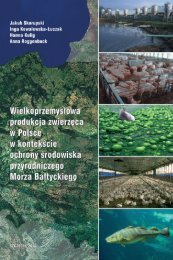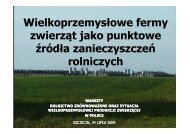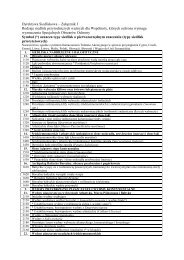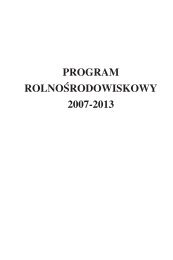best available technologies for manure treatment - Baltic Green Belt
best available technologies for manure treatment - Baltic Green Belt
best available technologies for manure treatment - Baltic Green Belt
You also want an ePaper? Increase the reach of your titles
YUMPU automatically turns print PDFs into web optimized ePapers that Google loves.
Best Available Technologies <strong>for</strong> <strong>manure</strong> <strong>treatment</strong> baltic sea 2020<br />
ANNEX I: REPORT FROM ROUNDTABLE DISCUSSION<br />
Ulla-Britta Fallenius commented that the most<br />
important data is the specific amounts of nutrients<br />
that actually reach the <strong>Baltic</strong> Sea, and not what is put<br />
on fields.<br />
Lena Rohde said similarly, that it would be interesting<br />
to know how much actually is retained in the<br />
produced pork, and also pointed out that Denmark<br />
in the period with increased import of (N in) protein<br />
feed also had increased its export of (N in) pork.<br />
Re. 6: Presentation of complete list<br />
Henning Foged started the presentation with explaining<br />
how the word <strong>technologies</strong> and leaching had<br />
been defined in the project. He said that more than<br />
30 livestock <strong>manure</strong> <strong>treatment</strong> <strong>technologies</strong> had been<br />
listed, and are being described with respect to their<br />
effect on leaching, their cost, etc. Included in the<br />
complete list of <strong>technologies</strong> were also <strong>technologies</strong><br />
like legally based P norms <strong>for</strong> fertilising and the use<br />
of a P-index (inspired from his visit to USA).<br />
Ulla-Britta Fallenius commented that anaerobic<br />
digestion does not have effect on leaching because the<br />
input and output amounts of N and P are the same.<br />
She also mentioned that HELCOM already had<br />
bound member states to introduce P norms.<br />
It was clarified from the discussion that several<br />
countries already had P norms (Sweden, Lithuania,<br />
and Finland) and that HELCOM Action Plan<br />
decides P norms in all <strong>Baltic</strong> nations. Henning Foged<br />
said that this was not the case <strong>for</strong> Denmark. Vaclovas<br />
Beržinskas pointed out that HELCOM is without<br />
sanction possibilities, and that its role is restricted.<br />
Re. 7: Prioritising <strong>technologies</strong><br />
Henning Foged in<strong>for</strong>med that the current list with<br />
<strong>technologies</strong> will be reduced; <strong>technologies</strong> with no<br />
apparent leaching reduction effect will be removed<br />
as will <strong>technologies</strong> which are likely to have some<br />
environmental hazards (e.g. leaching or other unacceptable<br />
environmental hazards). The list shall also<br />
be reduced with <strong>technologies</strong> which currently are<br />
un-validated and/or still at research level and with<br />
<strong>technologies</strong> <strong>for</strong> which there could be ethical considerations<br />
hindering their effective dissemination.<br />
The rest of the <strong>technologies</strong> are ranked according the<br />
Project Leaders view on a combination of their costefficiency,<br />
complexity of implementation, legal and<br />
other bottlenecks.<br />
Prioritising will happen on basis of facts in a pragmatic<br />
way, by Henning Foged and his colleagues in<br />
discussion with <strong>Baltic</strong> Sea 2020. A group discussion<br />
followed, on whether;<br />
• Aerobic <strong>treatment</strong>s should be down-prioritised<br />
due to their risk of production of laughter gas and<br />
loss of N?<br />
• Whether evaporation and drying is un-ethical due<br />
to its high energy consumption?<br />
• Whether incineration/combustion and other<br />
<strong>technologies</strong> <strong>for</strong> removal of plant nutrients are<br />
un-ethical because they cause higher consumption/production<br />
of mineral fertilisers, with the<br />
incurred energy consumption and negative<br />
climate effect.<br />
Henning added that<br />
• Technologies that ensure the recirculation of<br />
plant nutrients in the agricultural production<br />
have an economic advantage – the value of the<br />
N and P is typically € 10 per ton slurry (the<br />
cost of storing and spreading the liquid or solid<br />
<strong>manure</strong> is typically of the same magnitude)<br />
• Technologies, which comprise bioenergy recovery<br />
has an economic advantage, as the gas has an<br />
economic value. Additional to this they are beneficial<br />
<strong>for</strong> the society, because they make the<br />
countries more independent of imported energy<br />
resources, give a more diversified energy supply,<br />
and helps to reach international conventions and<br />
obligations in relation with climate gases and<br />
environmental loads. In some cases these society<br />
benefits have direct monetary values.<br />
• Technologies that cannot ”stand-alone” or have<br />
clear economies of scale would typically have an<br />
advantage of being implemented via farmer cooperation<br />
or a service provider.<br />
Thyge Nygaard said that anaerobic digestion gives a<br />
better field effect, and that it there<strong>for</strong>e also limits the<br />
amount of N that otherwise could be leached. Henning<br />
Foged said that the Danish Agricultural Advisory<br />
Service in their field trials had documented 17–30%<br />
92








